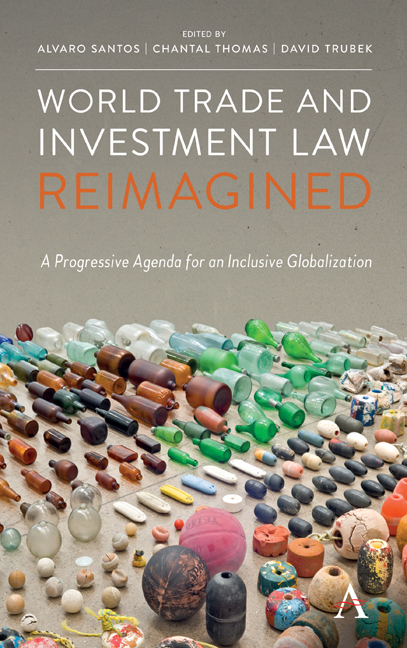Book contents
- Frontmatter
- Contents
- Acknowledgments
- List of Contributors
- Introduction World Trade and Investment Law in a Time of Crisis: Distribution, Development and Social Protection
- PART I RETHINKING THE POLITICAL ECONOMY OF TRADE: COMMENTS ON DANI RODRIK'S STRAIGHT TALK ON TRADE
- Chapter One Comments on Straight Talk on Trade
- Chapter Two Thoughts on Straight Talk on Trade
- Chapter Three Reading Rodrik: A Call for a New Law and Economics for International Law
- Chapter Four Reflecting on Straight Talk on Trade
- Chapter Five A Response to the Comments by Thomas, Gallagher, Shaffer and Santos
- PART II SETTING THE STAGE FOR A PROGRESSIVE VISION: EMERGING ISSUES IN WORLD TRADE AND INVESTMENT LAW
- SECTION 1 MAPPING THE NEW CONTEXT FOR TRADE AND INVESTMENT LAW
- SECTION 2 DEALING WITH MAJOR CHANGES IN THE WORLD ECONOMY
- SECTION 3 FRAMING A MORE EQUITABLE INVESTMENT LAW REGIME
- SECTION 4 SUPPORTING DEVELOPMENT
- SECTION 5 REINFORCING SOCIAL PROTECTION: SPREADING THE BENEFITS OF TRADE, DEALING WITH LOSSES AND EXPLORING THE TRADE–IMMIGRATION NEXUS
- Index
Chapter Two - Thoughts on Straight Talk on Trade
from PART I - RETHINKING THE POLITICAL ECONOMY OF TRADE: COMMENTS ON DANI RODRIK'S STRAIGHT TALK ON TRADE
Published online by Cambridge University Press: 07 September 2019
- Frontmatter
- Contents
- Acknowledgments
- List of Contributors
- Introduction World Trade and Investment Law in a Time of Crisis: Distribution, Development and Social Protection
- PART I RETHINKING THE POLITICAL ECONOMY OF TRADE: COMMENTS ON DANI RODRIK'S STRAIGHT TALK ON TRADE
- Chapter One Comments on Straight Talk on Trade
- Chapter Two Thoughts on Straight Talk on Trade
- Chapter Three Reading Rodrik: A Call for a New Law and Economics for International Law
- Chapter Four Reflecting on Straight Talk on Trade
- Chapter Five A Response to the Comments by Thomas, Gallagher, Shaffer and Santos
- PART II SETTING THE STAGE FOR A PROGRESSIVE VISION: EMERGING ISSUES IN WORLD TRADE AND INVESTMENT LAW
- SECTION 1 MAPPING THE NEW CONTEXT FOR TRADE AND INVESTMENT LAW
- SECTION 2 DEALING WITH MAJOR CHANGES IN THE WORLD ECONOMY
- SECTION 3 FRAMING A MORE EQUITABLE INVESTMENT LAW REGIME
- SECTION 4 SUPPORTING DEVELOPMENT
- SECTION 5 REINFORCING SOCIAL PROTECTION: SPREADING THE BENEFITS OF TRADE, DEALING WITH LOSSES AND EXPLORING THE TRADE–IMMIGRATION NEXUS
- Index
Summary
Straight Talk on Trade is an incredible collection and interweaving of many of Professor Dani Rodrik's accessible discussions on globalization and the world economy. While the book addresses issues of financial crises, trade policy and democratization, I will focus my comments on the issues most directly related to trade policy.
One of Rodrik's statements reflects his motivation for the book: “Globalization, at least as presently construed, tilts the balance of political power toward those with the skills and assets to benefit from the global economy, undermining whatever organized influence the losers might have had in the first place.” Implicit in this statement (though less so in his other writings) is the notion that the rules of the world economy are accentuating global inequities. Thus, the rules need fundamental reform to make the world economy work more efficiently and more equitably.
Like some of his other works, this book does not solely take aim at the major powers, and the interest groups that sway those powers, for these global inequities. Rodrik also blames economists.
It's the Economists
Riffing a bit from the book, one could argue that there are two major problems with the way most Western-trained economists engage with trade. First, they fail to acknowledge the content of trade and investment agreements and have consistent quantitative models for only a small part of what constitutes contemporary treaty-making. Second, they overstate— especially in public— the “gains” from their limited modeling exercises and understate the “losses.”
The modeling exercises that dominate trade policymaking take the form of computable general equilibrium (CGE) models that “work” only if good trade is modeled and if there is perfect competition, fixed employment, no externalities, no international investment and no technological change. Once one introduces economies of scale, services and investment, unemployment and so forth, the models will give spurious results, which, while important to study in seminars, should not be used by policymakers to make decisions.
As Rodrik discusses, the gains from trade, according to these modeling exercises, are minuscule relative to the size of the economies. The North American Free Trade Agreement (NAFTA), one of the largest trade deals, benefited the US economy by 0.08 of 1 percent.
- Type
- Chapter
- Information
- World Trade and Investment Law ReimaginedA Progressive Agenda for an Inclusive Globalization, pp. 37 - 40Publisher: Anthem PressPrint publication year: 2019

